Nuclear Disarmament and Non-Proliferation
The Third Meeting of the International Group of Eminent Persons for a World without Nuclear Weapons (IGEP)
(December 8-9 in Nagasaki)
On December 8 and 9, the third meeting of the International Group of Eminent Persons for a World without Nuclear Weapons (IGEP) was held in Nagasaki. A total of 14 members attended the meeting, including Chair SHIRAISHI Takashi, Chancellor of the Prefectural University of Kumamoto, and two other Japanese members, as well as 11 foreign members including those from both nuclear-weapon States and non-nuclear-weapon States (one member participated virtually and another was absent.). In addition, the Rt Hon. the Lord Browne of Ladyton, Member of the House of Lords of the United Kingdom (former Secretary of State for Defence) participated in person as a political leader, as well as Ambassador Amina Mohamed, former Cabinet Secretary for Foreign Affairs of the Republic of Kenya, who also participated as a political leader virtually. Furthermore, Dr. TOMONAGA Masao, Honorary Director of the Japanese Red Cross Nagasaki Nagasaki Atomic Bomb Hospital, participated in person in the capacity of an expert from the host city. From the Government of Japan, Special Advisor to the Prime Minister ISHIHARA Hirotaka attended the opening session on December 8, and Prime Minister KISHIDA Fumio and Parliamentary Vice-Minister for Foreign Affairs FUKAZAWA Yoichi attended the closing session on December 9. All of the participants held frank and candid discussions. Moreover, video messages were offered by four political leaders: H.E. Ms. Michelle Bachelet Jeria, former President of the Republic of Chile, H.E Mr. Mevlüt Çavuşoğlu, former Minister of Foreign Affairs of the Republic of Türkiye, the Honorable Sam Nunn, former United States Senator, and the Honorable John F. Kerry, United States Special Presidential Envoy for Climate.
Program overview
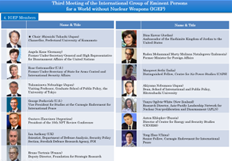
- December 8:
- Flower offering at Nagasaki Peace Park, visit to Nagasaki Atomic Bomb Museum, testimony by Hibakusha, dialogue with Hibakusha, dialogue with civil society, visit to the former Shiroyama National School Building, lunch hosted by Mr. ISHIHARA Hirotaka, Special Advisor to the Prime Minister, opening session (address by Prime Minister Kishida was delivered by Mr. Ishihara, session 1 and 2, welcome dinner co-hosted by Nagasaki Prefecture and Nagasaki City
- December 9:
- Session 3 and 4, briefing by the IGEP members to Prime Minister Kishida, closing session (attended by Prime Minister Kishida), conversations with Dr. Marty Natalegawa, Former Minister for Foreign Affairs of Indonesia, and Lord Des Browne, former U.K. Secretary of State for Defence, press conference by the IGEP members, dinner hosted by Mr. FUKAZAWA Yoichi, Parliamentary Vice-Minister for Foreign Affairs
1. Flower offering at Nagasaki Peace Park and visit to the Nagasaki Atomic Bomb Museum (In the morning of December 8)
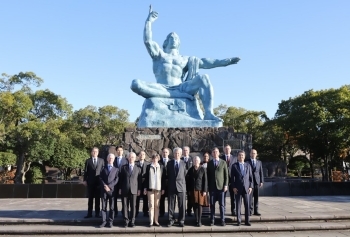
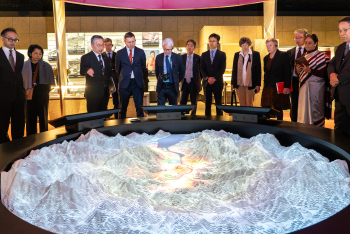
In the presence of Governor of Nagasaki Prefecture Dr. Oishi and Mayor of Nagasaki City Mr. Suzuki, the participants offered flowers in front of the memorial statue and then visited Nagasaki Atomic Bomb Museum under the guidance of Mr. Inoue, Director of Nagasaki Atomic Bomb Museum.
2. Testimony and dialogue with Hibakusha (In the morning of December 8)
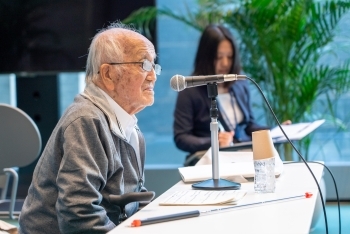
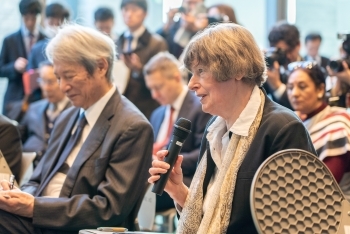
The IGEP members listened to a testimony given by Mr. TSUIKI Shohei, who suffered the atomic bombing in Nagasaki at the age of 18. This was followed bya dialogue with Mr. TSUIKI and three other Hibakusha on the theme of "Hibakusha's Thoughts toward a 'World without Nuclear Weapons'".
3. Dialogue with civil society (In the morning of December 8)
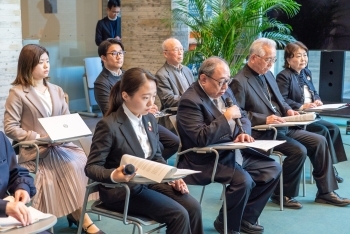
The participants from the civil society, including Youth Communicators for a World without Nuclear Weapons, introduced their activities and expressed their desire to spread the stories of A-bomb experiences as a tragedy that can happen to anyone, and not as someone else's problem. The IGEP members expressed their respect for the fact that the wide range of citizens, including high school and university students, are succeeding the experience of the reality of the atomic bombing and working to spread it around the world.
4. Visit to the former Shiroyama National School Building (In the afternoon of December 8)
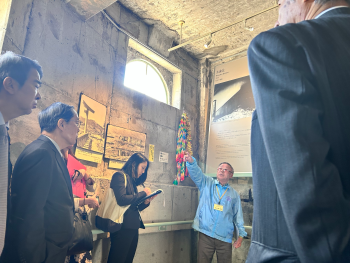
The IGEP members visited the former Shiroyama National School Building, which is located approximately 500m west of the hypocenter, under the guidance of Shiroyama National School Building Peace Dissemination Council. The building is one of Nagasaki Atomic Bomb Historic Ruins.
5. Lunch hosted by Mr. ISHIHARA Hirotaka, Special Advisor to the Prime Minister (In the afternoon of December 8)
Mr. ISHIHARA, Special Advisor to the Prime Minister, hosted a lunch for the IGEP participants. While welcoming their visit to Japan, Mr. Ishihara expressed his hope that the discussions at the IGEP meeting to build the international momentum towards a world without nuclear weapons, with members from both nuclear-weapon States and non-nuclear-weapon States, as the international security environment becomes even more challenging. The participants had fruitful conversations.
6. Opening session (In the afternoon of December 8)
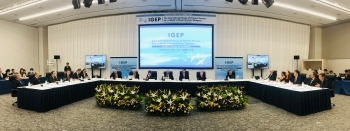
Mr. Ishihara, Special Advisor to the Prime Minister, delivered Prime Minister Kishida’s opening address on his behalf while also offering the welcoming remarks at the opening session. In the address, Prime Minister Kishida mentioned that we do not stop moving forward to the world without nuclear weapons no matter how difficult the path may be, and we must continue to advance realistic and practical efforts. To this end, he pointed out that the sage of the IGEP, based on professional and constructive discussions, is indispensable. He also mentioned that this meeting is an important opportunity to deeply discuss the fundamental issues that we must overcome for a world without nuclear weapons from today's perspective, and to begin consideration of the final product of the IGEP for the 2026 NPT Review Conference, with hope that participants will have frank and candid discussions and show a concrete path toward a world without nuclear weapons. This address was followed by the video messages from three political leaders: former Chilean President Bachelet, former Turkish Foreign Minister Çavuşoğlu, and former United States Senator Nunn, along with the opening remarks virtually offered by former Kenyan Foreign Secretary Mohamed. Then, each IGEP member and Dr. Tomonaga delivered their opening remarks.
In the opening remarks, Chair Shiraishi stated that, in the midst of the continuing severe security environment and the division between nuclear weapon States and non-nuclear weapon States, he would like to discuss difficult issues in a frank and civilized manner. Dr. Tomonaga stated that the international community must work together toward the realization of a nuclear-free world, despite the continuing divisions among nations.
Video messages from political leaders
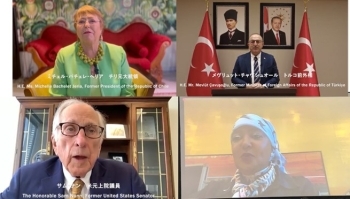
- H.E. Ms. Michelle Bachelet Jeria, former President of the Republic of Chile (Video)

- H.E Mr. Mevlüt Çavuşoğlu, former Minister of Foreign Affairs of the Republic of Türkiye (Video)

- The Honorable Sam Nunn, former United States Senator (Video)

- Ambassador Amina Mohamed, former Cabinet Secretary for Foreign Affairs of the Republic of Kenya
7. Sessions
Through the four sessions over the two-day meeting, the IGEP members engaged in vigorous discussions on the discussions such as challenges in advancing nuclear disarmament, priority issues to be addressed in the field of nuclear disarmament, and the future discussions in the IGEP. Particularly, they discussed the fundamental challenges that must be overcome for a world without nuclear weapons from today's perspective, including changes in the international security environment and emerging technologies.
8. Closing session (In the afternoon of December 9)
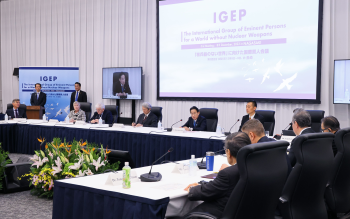
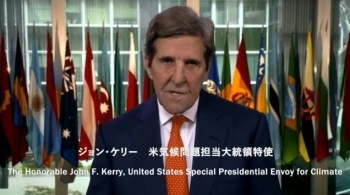
In the afternoon of December 9, Prime Minister Kishida attended the closing session after being briefed by the IGEP members on their discussions. In the session, following the video message by the Honorable John F. Kerry, U.S. Special Presidential Envoy for Climate, Prime Minister Kishida stated that the significance of the IGEP lies in renewing our shared determination to ensure that Nagasaki is the last place to suffer an atomic bombing through candid discussions, and that nothing is more valuable than the fact that the IGEP members have deepened their understanding of the realities of the atomic bombing. He also stated that that he will continue to demonstrate strong leadership toward a world without nuclear weapons, while also taking into account the sage views of the IGEP.
Prime Minister Kishida held short conversations with Dr. Marty Natalegawa, Former Minister for Foreign Affairs of Indonesia and Lord Des Browne, former U.K. Secretary of State for Defence, respectively, and concurred to continue to work together toward a world without nuclear weapons.
9. Press Conference after the sessions (In the afternoon on December 9)
At the beginning, Chairman Shiraishi mentioned that the IGEP members agreed that "Nagasaki must be the last place to suffer an atomic bombing" and on maintaining the norm of no use of nuclear weapons and informed that the IGEP will hold two meetings next year and that the next meeting is expected to be organized around spring of next year upon.
Ms. Angela Kane, Former Under-Secretary-General and High Representative for Disarmament Affairs of the United Nations, stated that she was impressed to learn the efforts by the civil society and to deepen her understanding of the realities of the atomic bombing. She also mentioned that the IGEP members were able to discuss various viewpoints toward a world without nuclear weapons based on such experiences.
Lord Des Browne, former U.K. Secretary of State for Defence, stated that the meeting enabled him to participate in professional discussions and he expressed his high regard for Prime Minister Kishida's initiative.
Dr. Tomonaga expressed his gratitude for the opportunity to participate on behalf of Nagasaki’s citizens and Hibakusha, and said that it was meaningful to hear the various opinions of the IGEP members and to have meaningful discussions.
10. Dinner hosted by Mr. FUKAZAWA Yoichi, Parliamentary Vice-Minister for Foreign Affairs (In the evening on December 9)
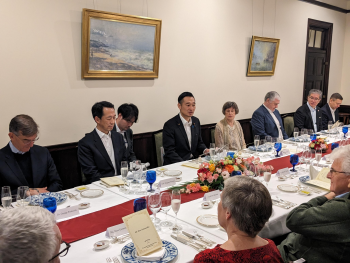
In the evening of December 9, the IGEP members attended a dinner hosted by Mr. Fukazawa, Parliamentary Vice-Minister for Foreign Affairs, and had an exchange of views in a friendly atmosphere.


